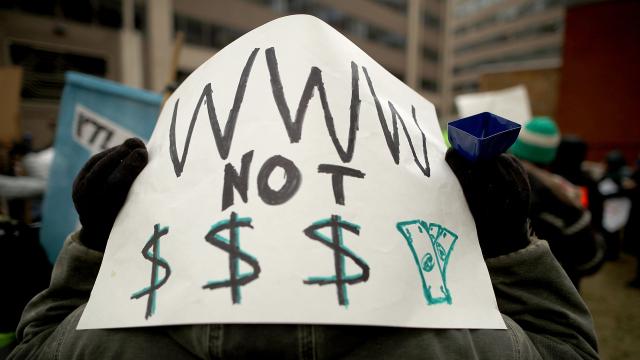Photo: Getty
California’s two net neutrality bills are poised to become one, offering the state’s 40 million residents comprehensive protection against internet service provider trying to shakedown businesses and subscribers in the wake of the FCC repeal.
Lawmakers hope to pass a watertight law by combing two bills that prevent ISPs such as AT&T and Comcast from blocking or slowing down the delivery of online content, and from charging online companies exorbitant fees to have apps and services load properly. The broader aim is to effectively reinstate the protections undone by the Federal Communications Commission’s Republican majority late last year.
The bills introduced by state Senators Scott Wiener and Kevin de León — SB 822 and SB 460, respectively — will be joined through a process known as “contingent enactment,” meaning both bills must pass, or neither will become law. When the bills are linked via a pair of amendments introduced on Monday, the two lawmakers will become coauthors of each other’s bill.
“California must step up to protect our residents and businesses,” Sen. Wiener said. “I’m thrilled to partner with Senator De Leon and our broad coalition to get this bill passed.”
The joining of the bills follows blunt criticisms last week of de León’s bill by as many as 48 progressive organisations that favoured Wiener’s SB 822, which is considered the model for state-level net neutrality legislation. The groups, including Colour of Change, Free Press, and Fight for the Future, said SB 460 left open several loopholes that would invite ISPs to violate net neutrality, a founding principle of the internet that essentially demands ISPs deliver all data to customers equally.
Notably, de León’s bill did not contain provisions to prohibit “access fees” (fees imposed by ISPs on application and content providers to reach end users), nor did it address the attempts by ISPs to extort companies that manage web traffic between ISPs and the rest of the internet by congesting interconnection points.
The joined bill will combine SB 822’s comprehensive protections while SB 460 will retain provisions requiring state agencies to only do business with ISPs that respect net neutrality.
“In a climate where we are unable to depend on the federal government to protect the free and open internet, it is a relief that our state legislators are doing their jobs and listening to the concerns of their constituents over those of the wealthy corporate ISPs,” said Jiggy Athilingam, the state & local policy manager for Indivisible Project, one of the groups whose chapters came out strongly for SB 822 on Friday.
The amended versions of SB 822 and SB 460 will be heard by the California Assembly’s Communications and Conveyance Committee, which is controlled 9-4 by Democrats, all of whom say net neutrality remains a top priority. Notwithstanding, the broadband industry is a powerful lobby in California and the legislators are under pressure to reject the bills.
California lawmakers and activists alike say that AT&T, Comcast, and Verizon are burning through cash in an attempt to block the net neutrality bills; with SB 822 being particularly targeted.
An organisation called CALInnovates — a nonprofit that receives “support” from AT&T, and described AT&T as its “partner” — has targeted California residents with a slew of Twitter ads attacking SB 822 while specifically calling out Democrats on the state’s Communications and Conveyance Committee.
AT&T is itself passing out flyers containing talking points for California lawmakers calling SB 822 an “unwarranted attack on an industry that invests billions in infrastructure in California.” The committee’s chair, Miguel Santiago, is said to be a prime target of the AT&T’s efforts.
In a statement, Alexis Ohanian, the co-founder of Reddit, said he was pleased that Wiener and de Leon had come together to “defend the net neutrality protections that made it possible for me to start the country’s third most-visited website when I was just out of college and that will help support so many creators and entrepreneurs going forward.”
“Net Neutrality is the best way to protect consumer choice, the open marketplace of ideas and America’s ability to innovate,” said Philip Rosedale, founder and CEO of open-source VR software company High Fidelity. “We applaud this unified effort to bring back comprehensive protections in California and set an example for the rest of the country.”
California Attorney General Xavier Becerra also praised de León and Wiener’s efforts on Monday, saying they have the “unwavering support” of the California Justice Department.
Before being voted on by the state Assembly, the bills will require approval from other committees as well, including the Committee on Privacy and Consumer Protection. The Communications and Conveyance Committee hearing is slated for this week.
